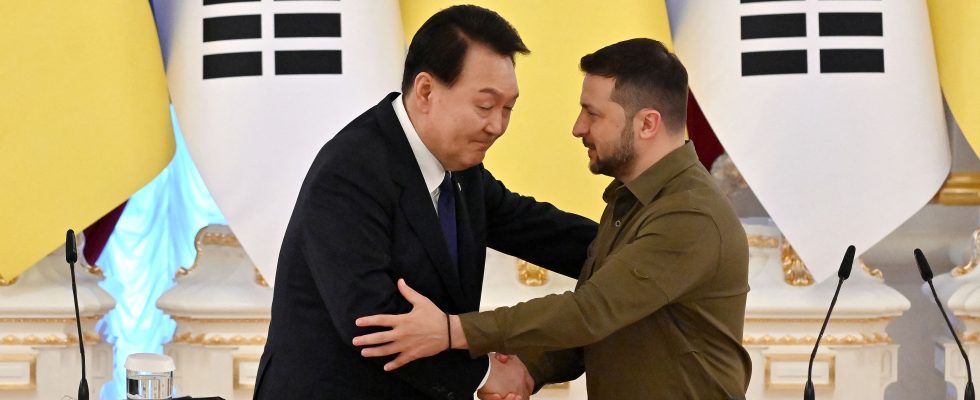A highly symbolic exchange of manly gifts. On the occasion of his visit to Russia, North Korean leader Kim Jong-un and Russian President Vladimir Putin gave each other rifles made in their respective countries on September 14. The two dictators had wandered two days earlier in the immense Vostotchny cosmodrome, in the south-east of Siberia, one of the launch pads for Russian rockets. Even if no agreement has been announced, this rapprochement could mark a shift in the geopolitics of the war in Ukraine.
At the same time, in the south of the Korean peninsula, Seoul, an ally of the United States for seventy years, is fully in the Western camp. President Yoon Suk-yeol has met his US counterpart Joe Biden several times this year; his government condemned the Russian invasion at the United Nations and sent non-lethal equipment to kyiv. “In Asia, South Korea and Japan are the only countries to have blamed Russia, imposed economic sanctions and provided aid to Kiev,” said Ramon Pacheco Pardo, professor at King’s College London.
Russia’s second largest trading partner in Asia
South Korea nevertheless finds itself in an uncomfortable situation. Despite Western sanctions, it does not wish to break its ties with Moscow, strengthened during the mandate of former President Moon Jae-in (2017-2022). Seoul is now Russia’s second largest trading partner in Asia, behind China! The country is banking on the size of the Russian market, while sourcing hydrocarbons there to limit its dependence on the Middle East.
When the war in Ukraine broke out, some South Korean companies, such as manufacturers Samsung, LG and Hyundai, ended up stopping production in Russia. But others, like the food giants Lotte, Paldo and Orion, continue their activity. “We have not received any request from the Korean government on this subject,” defends the spokesperson for Paldo, a specialist in instant noodles, which achieved nearly 250 million euros in turnover in Russia in 2022. Companies preferring to remain discreet argue that it would be too difficult to return to the Russian market after having left it.
Last year, South Korea’s exports to Russia fell 37 percent. But many groups continue to trade with Russia through neighboring countries. South Korean exports to Kazakhstan, for example, doubled in 2022, reaching $1.65 billion. “The government emphasizes democracy, freedom and the rule of law, but it always pursues its economic interests,” summarizes Jeffrey Robertson, professor of diplomatic studies at Yonsei University in Seoul.
The condition of Seoul
On the military level too, South Korea is ambiguous. The world’s eighth largest arms exporter has a cutting-edge arsenal, competing in Europe with market giants like France and the United States. Despite the requests of Volodymyr Zelensky – whom he went to visit in Kiev – and American pressure, the South Korean president nevertheless remains faithful to his line: Seoul will not provide weapons to Ukraine, unless “the Russia carries out operations against civilians. The war crimes committed in particular in Boutcha clearly did not change his mind.
Officially, South Korean law prohibits the delivery of weapons to a country at war. But this nation of 52 million inhabitants seeks above all not to offend Putin, so that he does not provide military or technological aid to North Korea. Which does not prevent him from indirectly supporting kyiv. “Seoul supplies arms to kyiv via third parties,” explains Ramon Pacheco Pardo. “Poland thus received authorization to export South Korean Krab artillery pieces to Ukraine.” South Korea has also concluded an agreement to supply the United States with 500,000 155-millimeter artillery shells, which could facilitate the American supply of ammunition to Ukraine, according to the South Korean press.
It remains to be seen whether the rapprochement between Putin and Kim will encourage Seoul to support kyiv more openly. “If cooperation between Russia and North Korea intensifies, this will demonstrate the ineffectiveness of the current policy, analyzes Jeffrey Robertson. But it is unlikely that Seoul will change its position.” The risk of an escalation is undoubtedly considered too great.
